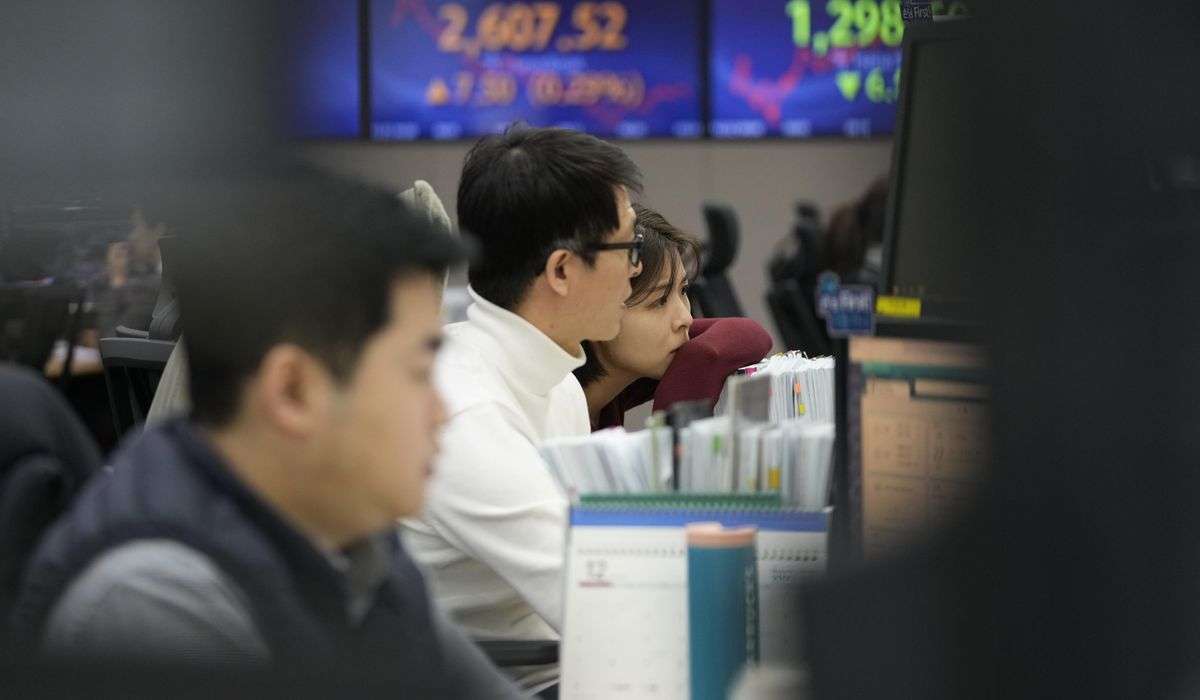Stock market today: Wall Street ticks closer to record highs to cap its 8th straight winning week

NEW YORK — Wall Street closed its eighth straight winning week with a quiet finish following reports showing inflation on the way down and the economy potentially on the way up. The S&P 500 rose 0.2% Friday to sit less than 1% below its record. The Dow slipped less than 0.1%, and the Nasdaq composite edged 0.2% higher. Bristol-Myers Squibb helped lift the market after agreeing to buy Karuna Therapeutics. That helped offset a slump for Nike, which cut its revenue forecast and dragged on the Dow. Treasury yields were little changed following reports showing cooler-than-expected inflation and stronger spending by U.S. consumers.
THIS IS A BREAKING NEWS UPDATE. AP’s earlier story follows below.
NEW YORK (AP) – Wall Street is drifting near record heights Friday following reports showing inflation on the way down and the economy potentially on the way up.
The S&P 500 rose 0.4% in afternoon trading and just 0.7% below its record set nearly two years ago. The Dow Jones Industrial Average gained 58 points, or 0.2%, as of 1 p.m. Eastern time, and the Nasdaq composite edged 0.4% higher.
Bristol Myers Squibb climbed 2.7% after saying it will buy Karuna Therapeutics in a cash deal valued at a total of $14 billion. That helped to offset an 11% slump for Nike, which cut its revenue forecast for its fiscal year. The athletic giant cited weakness in China, the downsides of a stronger U.S. dollar for exporters and other challenges.
But Wall Street’s focus was squarely on a suite of economic reports released Friday, which led to some swings in Treasury yields.
Falling yields have been a primary reason the stock market has charged roughly 15% higher since late October. Not only do they boost the economy by encouraging borrowing, they also relax the pressure on the financial system and goose prices for investments. They’ve been largely easing on hopes that inflation has cooled enough for the Federal Reserve to cut interest rates in 2024.
A report on Friday showed the measure of inflation the Federal Reserve prefers to use slowed by more than economists expected, down to 2.6% in November from 2.9% a month earlier. It echoed other inflation reports for November released earlier in the month.
The latest numbers also showed spending by U.S. consumers unexpectedly rose during the month. While that’s a good sign for growth for an economy driven mainly by consumer spending, it could also indicate underlying pressure remains on inflation.
The Federal Reserve is walking a tightrope, seeking to slow the economy enough through elevated interest rates to cool inflation, but not so much that it tips into a recession. A stronger-than-expected economy could complicate that balancing act.
Other reports on Friday showed orders for long-lasting manufactured goods strengthened more in November than expected, sales of new homes unexpectedly weakened and sentiment for U.S. consumers improved.
The yield on the 10-year Treasury edged up to 3.90% from 3.89%, where it was late Thursday. But it swerved a couple of times following the reports’ release.
In October, the 10-year yield was above 5% and putting painful downward pressure on the stock market.
“People are tightening their belts, but they’re not suffocating their spending,” said Brian Jacobsen, chief economist at Annex Wealth Management. “Inflation has moderated significantly and the run-rate for inflation is now at the Fed’s target, if not lower.”
Traders are largely betting the Federal Reserve will cut its main interest rate by at least 1.50 percentage points by the end of next year, according to data from CME Group. The federal funds rate is currently sitting within a range of 5.25% to 5.50% at its highest level in more than two decades.
The Federal Reserve released projections last week showing its typical policymaker expects to cut the federal funds rate several times next year, but likely by only half as much as what Wall Street is expecting.
Critics see too much optimism on Wall Street about how many rate cuts may come in 2024 and when they could begin. They warn the big run for stocks since late October on anticipation of such support may be overdone. The S&P 500 is on track for an eighth straight winning week, which would be its longest such streak since 2017.
In stock markets abroad, indexes were mixed in Europe and Asia.
Hong Kong’s Hang Seng dropped 1.7% after China released new regulations for online gaming. That sent stocks of Tencent, China’s largest gaming company, and rival NetEase down sharply.
___
AP Business Writer Elaine Kurtenbach contributed.






